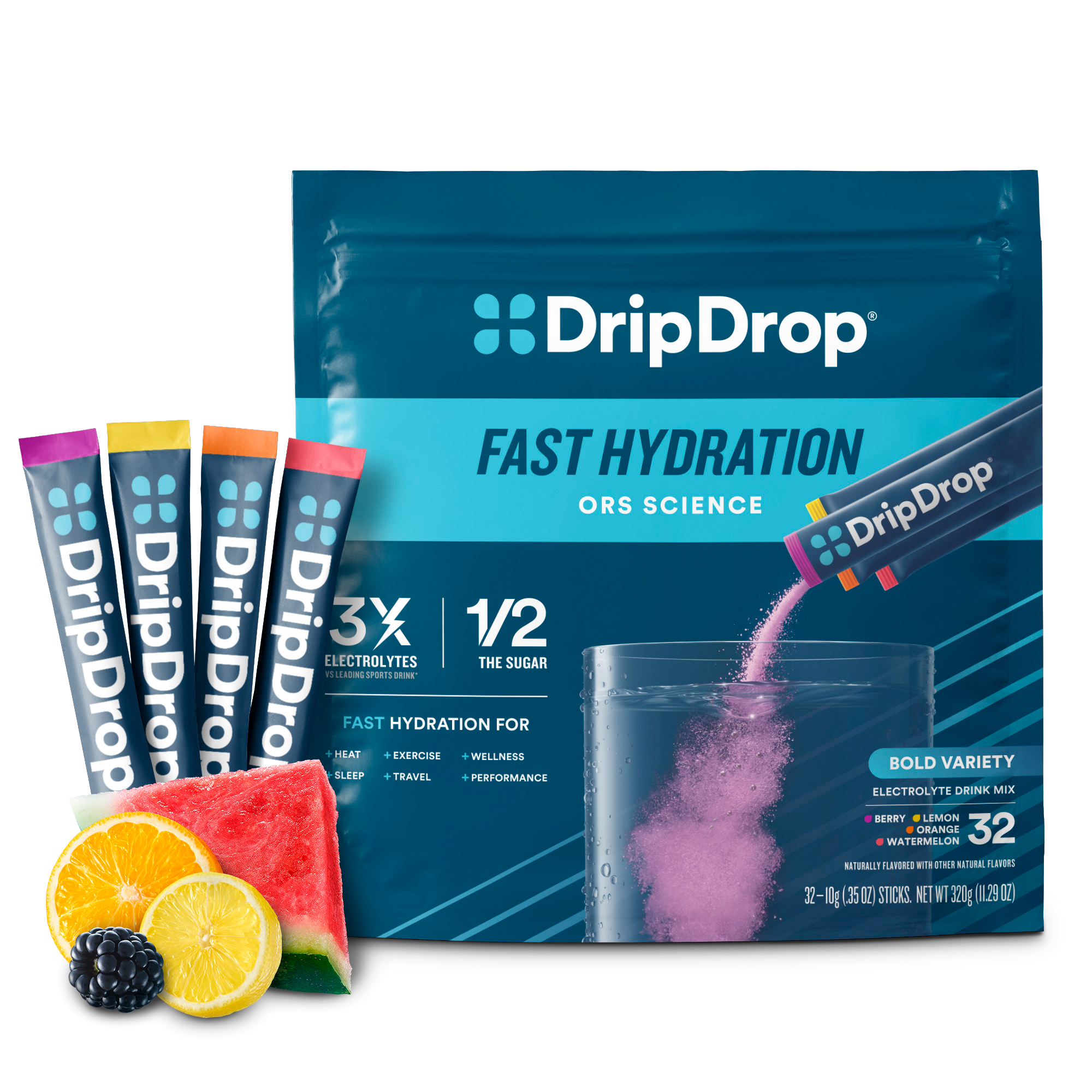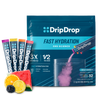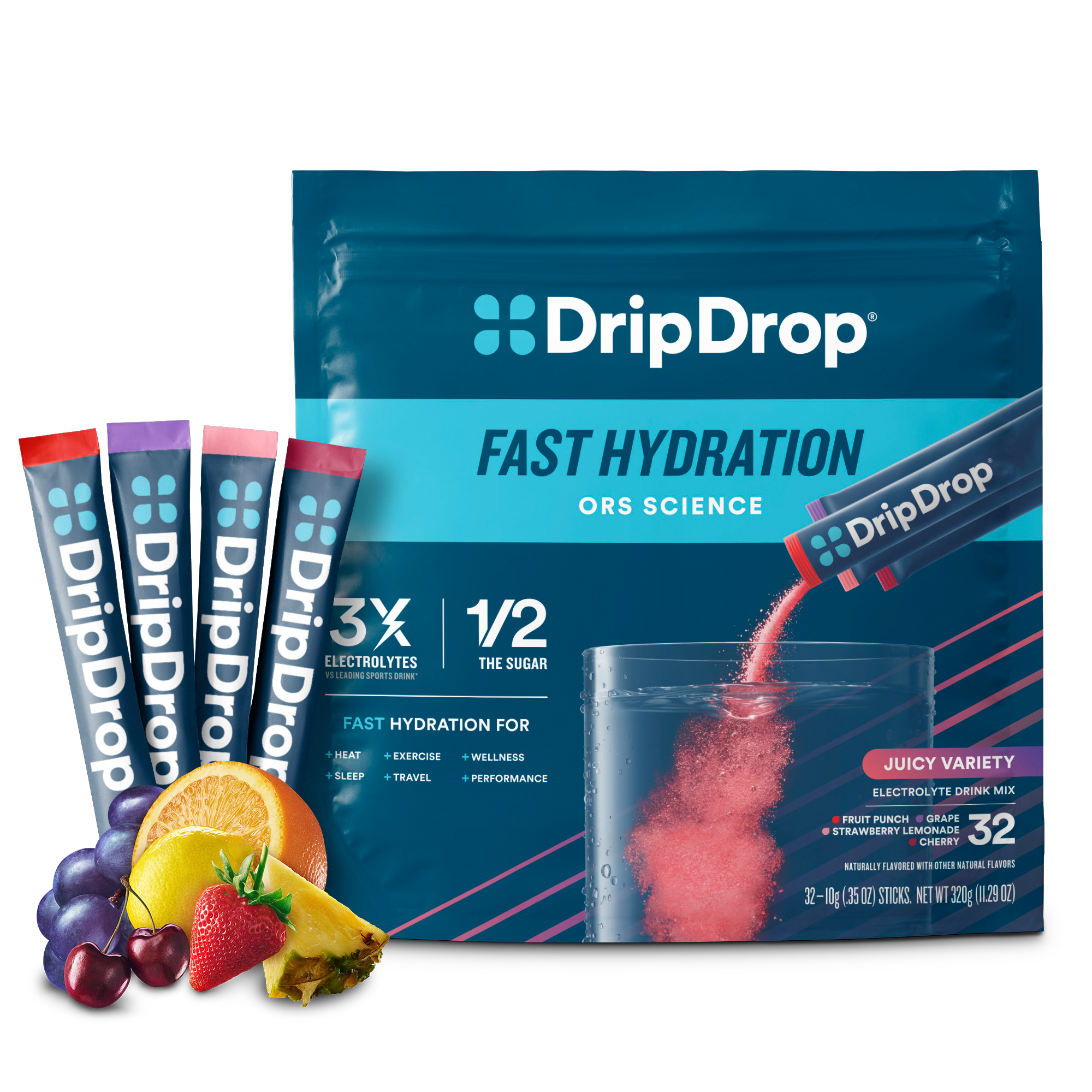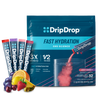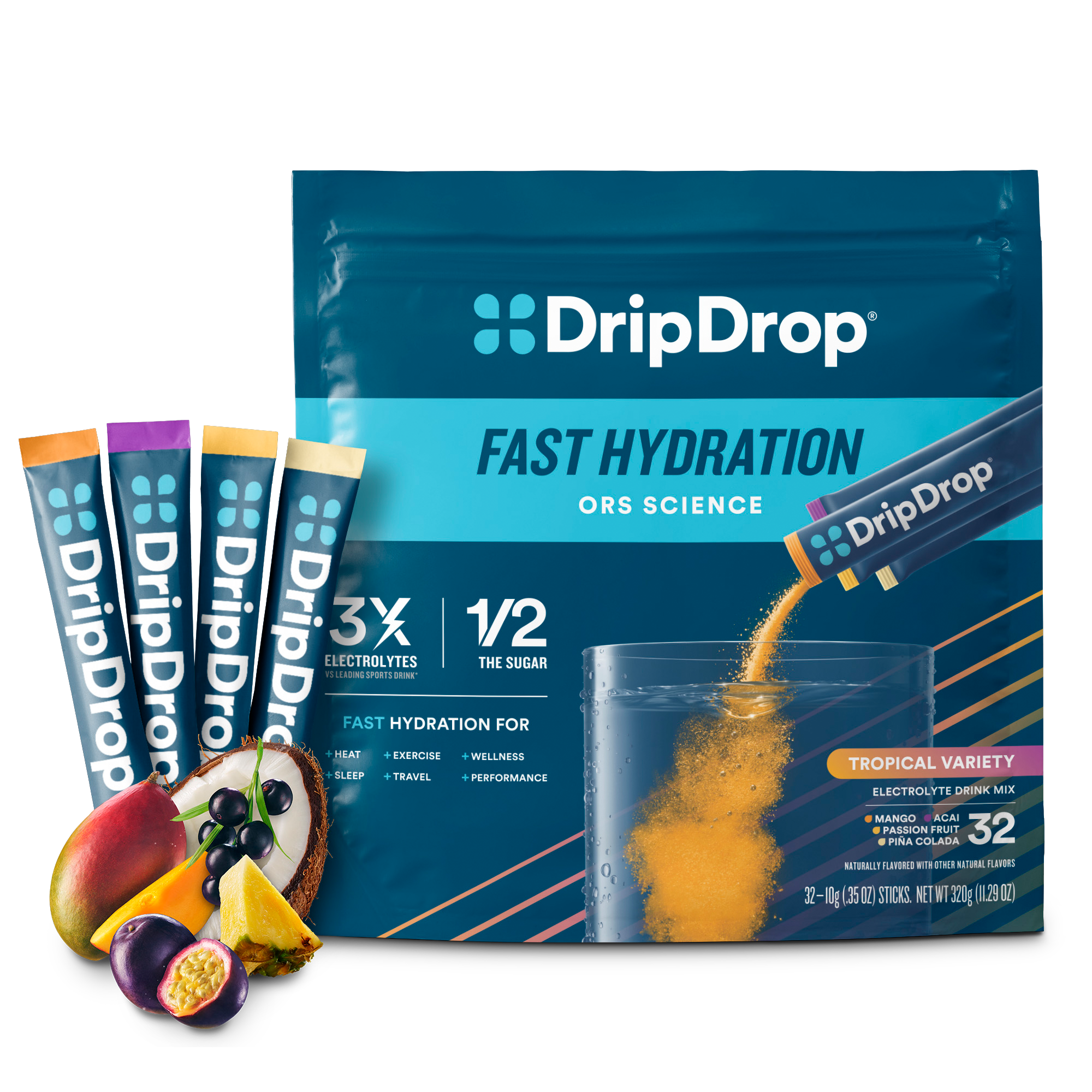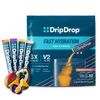It’s no secret that hydration plays a role in the way we feel and move throughout the day. When we don’t get enough fluids, headaches, dizziness, and sluggishness can set in. What many people don’t realize is that hydration can also dramatically affect your quality of sleep. In fact, there’s a strong correlation between excessive daytime sleepiness (EDS) and dehydration.
Even having a mild case of dehydration when you hit the sack can impact your natural circadian rhythm and cause sleep disruptions. Here, we’ll show you the connection between dehydration and excessive daytime sleepiness. You’ll also learn about other causes of daily fatigue and how an oral rehydration solution like DripDrop can help manage dehydration. That way, you’re more likely to get a good night’s sleep.
The Connection Between Dehydration and Fatigue
Your body needs more than just plain water to stay hydrated. It requires a precise ratio of electrolytes — including minerals like potassium, calcium, and sodium — to retain and balance fluid inside and outside of your cells. Electrolytes are also essential when it comes to sending neurotransmitter signals throughout the body, regulating blood pH levels, and providing energy for muscle contractions.
When you don’t get enough electrolytes or water, you can suffer from a condition called dehydration. Signs of dehydration include headaches, muscle cramps, dizziness, high blood pressure, excessive thirst, and constant lack of energy.
If you go to bed dehydrated, you can suffer from poor sleep. That’s because dehydration can cause nocturnal leg cramps, limb movement, and discomfort that causes you to wake up throughout the night. Dehydration can also affect melatonin — a sleep hormone that plays a key role in regulating your circadian rhythm, or natural sleep cycle. Chronic dehydration reduces the presence of amino acids in your body that produce melatonin.
Without enough melatonin, you may not get sleepy at night or may feel fatigued during daylight hours, causing exhaustion and excessive daytime sleepiness. Melatonin also plays an indirect role in the metabolism of water and electrolytes. If you don’t have enough melatonin because you’re dehydrated, your sleep may suffer even further. To make matters worse, you naturally lose some fluids and electrolytes when you sleep.
According to the National Sleep Foundation, this is particularly true if you’re a hot sleeper or suffer from night sweats or sleep disorders like obstructive sleep apnea (OSA). When you breathe through your mouth or snore, moisture evaporates, causing dryness and a loss of body fluids. In addition, sleeping in a hot bedroom can cause you to sweat, causing even more electrolyte and fluid loss.
Treatments for sleep disorders such as continuous positive airway pressure (CPAP) devices and medications like Modafinil can also increase dehydration by drying out mucous membranes.
Additional sleep studies also indicate that bad or short sleep can lead to dehydration, further compounding the cycle of dehydration and poor sleep quality. This research indicates that sleep deprivation or poor sleep quality can affect the production of the antidiuretic hormone vasopressin, which plays a key role in hydration. Additional studies show that dehydration can increase the risk of diseases that affect the kidneys, which play a vital role in proper hydration.
If you go to bed with even a mild case of dehydration, these effects can wreak havoc on your body’s fluid volume. The result the next day is excessive daytime sleepiness that includes grogginess, fatigue, and lethargy. The best way to avoid these negative sleep impacts is to stay hydrated throughout the day with an oral rehydration solution like DripDrop.
Other Causes of Excessive Daytime Sleepiness
In addition to dehydration, excessive daytime sleepiness can be caused by a variety of factors. Some common causes of excessive daytime sleepiness include sleep disorders such as sleep apnea, narcolepsy, idiopathic hypersomnia, Kleine-Levin syndrome, and restless legs syndrome.
Medical conditions including kidney and renal disease can also increase the risk of dehydration, drastically increasing the risk of sleep problems and excessive daytime sleepiness. Taking medications like methylphenidate (Ritalin) is also a risk factor for excessive daytime sleepiness. In addition, jet lag and shift work can also lead to excessive daytime sleepiness and disruptions in REM sleep (rapid eye movement sleep).
Tiredness and fatigue can be particularly problematic for shift workers who work night shifts or rotating shifts. That’s because these schedules can interrupt your body’s natural circadian rhythm, making it difficult for your brain to tell when you should be tired and when you should be alert.
Shift work can lead to insufficient sleep and also cause you to feel sleepy at unsafe or inappropriate times — like when you’re operating machinery or driving. The American Academy of Sleep Medicine recommends using bright light therapy, taking sleep medicines, and focusing on hydration to avoid the effects of shift work on sleep.
Excessive Daytime Sleepiness Treatments
When it comes to treatment options for excessive daytime sleepiness, lifestyle changes are key. Staying hydrated is one of the most effective ways to avoid sleep problems that can be caused or exacerbated by dehydration.
Not all hydration methods are as effective. Drinking an oral rehydration solution like DripDrop is the best choice since it contains medically relevant levels of electrolytes your body needs to function properly.
It also contains a precise ratio of sodium and glucose. This enables your body to absorb electrolytes and fluids more quickly through to the sodium-glucose cotransport system. In this system, transporters bind with sodium and glucose ions in the kidneys and intestines. This helps your cells absorb electrolytes at high frequencies, reducing dehydration fast.
It’s important to make sure you stay hydrated throughout the day, not just at night. Drink an oral rehydration solution first thing in the morning to combat your loss of fluids and electrolytes while you were sleeping. Then, sip an oral rehydration solution throughout the day.
In addition, it’s a good idea to avoid caffeine and alcohol, which can increase dehydration and heighten the risk of sleep problems. Exercise can also lead to dehydration, particularly if you don’t replace the electrolytes and water you lose when sweating. Avoid exercising right before bed, and make sure to use an oral rehydration solution to remedy dehydration. Practice proper sleep hygiene by sleeping in a cool room and removing distractions such as technology to get a restful night’s sleep.
If you think your excessive daytime sleepiness is caused by a medical condition, make an appointment to see a healthcare professional. A doctor can conduct polysomnography tests such as the Maintenance of Wakefulness Test (MWT) or a Multiple Sleep Latency Test (MSLT) to determine the underlying cause. These tests can identify disorders including narcolepsy, cataplexy, sleep paralysis, and other sleep disorders that affect the central nervous system.
Stay Hydrated With DripDrop
The best way to avoid dehydration that can cause fatigue is to hydrate with an oral rehydration solution like DripDrop. When you're in a state of dehydration, no amount of water is enough. Your body needs the perfect balance of sodium and glucose to help absorption.
With the precisely balanced ratio, you can replenish vital electrolytes and fluids to relieve dehydration quickly. Plus, DripDrop supplies vitamins like zinc, potassium, and magnesium, which are essential for supporting your overall health and promoting healthy sleep.
DripDrop is powerful enough to use in extreme circumstances but safe enough for everyday use. The precise formula provides medically relevant electrolyte levels, improving on the World Health Organization’s Oral Rehydration Solution (ORS) standards because of its delicious taste, giving you a medically viable ORS that also tastes great. DripDrop also comes in a wide range of flavors including berry, watermelon, and orange so you can enjoy the tasty drink while remedying dehydration.
For cases of mild to moderate dehydration, DripDrop is a fast, effective, and great tasting remedy. Its convenient packaging allows you to have DripDrop when you need it, where you need it. Get started with our most popular multi-flavor pouch for dehydration relief fast. Or, learn more about how you can save up to 25% on every purchase when you subscribe.



